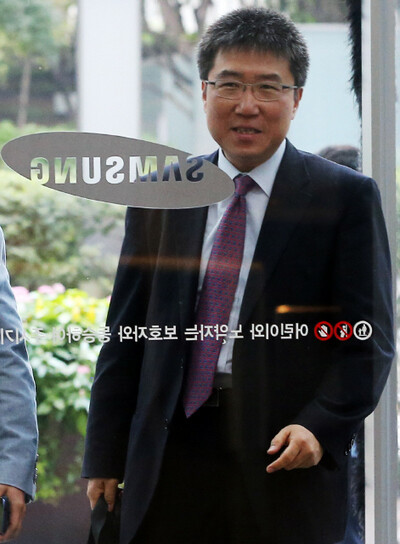hankyoreh
Links to other country sites 다른 나라 사이트 링크
Korea’s anti-neoliberal critic Chang Ha-joon defends chaebol

By Kim Jin-cheol, staff reporter
Advocates of chaebol reform are blasting Chang Ha-Joon for his views on the current business environment in South Korea.
This comes after the noted Cambridge University economics professor, who has consistently played up the positive aspects of the country’s chaebol system, refuted criticisms of the conglomerates’ “octopus-like expansion” during a meeting with executives from the Samsung Group.
Chang delivered a talk titled, “The Future Course of the South Korean Economy” at the Sept. 19 meeting. In his remarks, Chang reiterated previous criticisms of popular objections to circular equity investment and diversification by conglomerates.
“If [chaebol] are only supposed to work in their core businesses, then Samsung should still be producing textiles and sugar, and Hyundai would have to pave highways,” he said.
Chang also said chaebol diversification was a phenomenon “present in all advanced capitalist countries.”
“Circular equity investment was inevitable in the past because things like holding companies and cross-ownership were prohibited,” he explained. “To say it’s bad now is to disregard its history.”
Chang acknowledged that conglomerates developed in the past with support from the public and government, and said this is the context from which the “economic democracy” debate emerged.
“Economic democracy means creating a universal welfare state founded in civil rights, which requires conglomerates to accept a great social compromise,” he said.
He went on to say, “It is no easy task creating a virtuous cycle where welfare is a foundation for growth, but it is crucially important and takes quite a long time.”
But critics lambasted him for defending the expansion of South Korean chaebol into neighborhood businesses and their practice of funneling work to affiliates.
Kim Sang-jo, a Hansung University economics professor and director of Solidarity for Economic Reform, said Chang was overlooking a crucial aspect of diversification. While diversification may be necessary for the founding, and even second, generation of a conglomerate, Kim argued, expansion into areas like bakeries and street food in the third and fourth generations of the owning families has the sole aim of increasing the ruling family’s profits and is devastating to local business.
“Nobody’s saying diversification is generally wrong,” said Korea National Open University economics professor Kim Ki-won. “The problem is a structure where chaebol are importing everything down to wet wipes and choking SMEs and medium-sized businesses, without any regard for the national economy.”
“A great compromise is neither possible nor desirable,” he added.
Chang’s argument was also called unrealistic and irresponsible.
Kim Sang-jo said, “I think he ought to be more careful, given the impact his words have on South Korean society.”
Kim Ki-won said, “When you’re talking before Samsung, you need to point out what‘s not right. The problem is that he did nothing but flatter them.”
Please direct questions or comments to [english@hani.co.kr]

Editorial・opinion
![[Column] Season 2 of special prosecutor probe may be coming to Korea soon [Column] Season 2 of special prosecutor probe may be coming to Korea soon](https://flexible.img.hani.co.kr/flexible/normal/500/300/imgdb/original/2024/0426/3317141030699447.jpg) [Column] Season 2 of special prosecutor probe may be coming to Korea soon
[Column] Season 2 of special prosecutor probe may be coming to Korea soon![[Column] Park Geun-hye déjà vu in Yoon Suk-yeol [Column] Park Geun-hye déjà vu in Yoon Suk-yeol](https://flexible.img.hani.co.kr/flexible/normal/500/300/imgdb/original/2024/0424/651713945113788.jpg) [Column] Park Geun-hye déjà vu in Yoon Suk-yeol
[Column] Park Geun-hye déjà vu in Yoon Suk-yeol- [Editorial] New weight of N. Korea’s nuclear threats makes dialogue all the more urgent
- [Guest essay] The real reason Korea’s new right wants to dub Rhee a founding father
- [Column] ‘Choson’: Is it time we start referring to N. Korea in its own terms?
- [Editorial] Japan’s rewriting of history with Korea has gone too far
- [Column] The president’s questionable capacity for dialogue
- [Column] Are chaebol firms just pizza pies for families to divvy up as they please?
- [Column] Has Korea, too, crossed the Rubicon on China?
- [Correspondent’s column] In Japan’s alliance with US, echoes of its past alliances with UK
Most viewed articles
- 1‘We must say no’: Seoul defense chief on Korean, USFK involvement in hypothetical Taiwan crisis
- 2N. Korean delegation’s trip to Iran shows how Pyongyang is leveraging ties with Moscow
- 3[Column] Season 2 of special prosecutor probe may be coming to Korea soon
- 4‘Weddingflation’ breaks the bank for Korean couples-to-be
- 5[Column] Has Korea, too, crossed the Rubicon on China?
- 6[Editorial] New weight of N. Korea’s nuclear threats makes dialogue all the more urgent
- 7[Reportage] On US campuses, student risk arrest as they call for divestment from Israel
- 8Korea sees more deaths than births for 52nd consecutive month in February
- 9[Column] Park Geun-hye déjà vu in Yoon Suk-yeol
- 10[Guest essay] The real reason Korea’s new right wants to dub Rhee a founding father